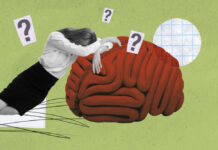A new study, published in Schizophrenia Bulletin Open, explores the long-term effects of antipsychotic medication use following treatment for first-episode psychosis (FEP). The researchers found that moderate-to-high exposure to antipsychotic medication was associated with poorer long-term outcomes. They call for further research to compare and contrast long-term antipsychotic treatment with other individualized approaches to treatment.
The researchers, led by Tomi Bergström of the Department of Psychiatry in the Länsi-Pohja Hospital District in Kemi, Finland, write:
“Many official treatment guidelines also recommend that antipsychotic treatment should be continued for several years following an acute psychotic episode since a maintenance treatment strategy has been associated with a lower incidence of relapses and with a decrease in rehospitalization rates. However, the risk-benefit ratio of longer-term maintenance treatment with antipsychotics is unclear, and current knowledge comes mainly from observational studies.”
 Antipsychotic medication aims to reduce severe psychotic symptoms in individuals diagnosed with schizophrenia or other psychotic disorders. However, they have been long critiqued for their adverse effects, causing changes to the brain, reducing cognitive functioning, and impairing psychosis recovery, among other detrimental effects. Recently, antipsychotics were also linked to severe cases of COVID-19, including those that resulted in fatalities.
Antipsychotic medication aims to reduce severe psychotic symptoms in individuals diagnosed with schizophrenia or other psychotic disorders. However, they have been long critiqued for their adverse effects, causing changes to the brain, reducing cognitive functioning, and impairing psychosis recovery, among other detrimental effects. Recently, antipsychotics were also linked to severe cases of COVID-19, including those that resulted in fatalities.
The risks associated with antipsychotics have led to investigations into other forms of treatment for psychotic disorders, such as more individualized, needs-based approaches, and psychosocial support. A highly stigmatized mental health disorder, psychosocial explanations of psychosis have been found to reduce stigma.
In the current study, researchers used data from Finnish national registers, which was originally collected to examine long-term outcomes of various treatment approaches. Researchers examined data over a 19-year period, which ultimately included a little over 1,300 individuals, ages 16-50 years old, with one or more hospital admissions due to non-affective psychosis.
The majority of the study participants were men (55%), with the average age being 31 years old. Using the national register data, researchers could access information regarding individuals’ demographics, mental health and medical care, mortality, and disability allowances. They were also able to access information on purchased antipsychotics from the onset of first-episode psychosis through the duration of the individual’s care.
Researchers found that those with higher antipsychotic exposure during the first 5 years following FEP tended to be men and more often had schizophrenia diagnoses. 19 years later, most of these individuals, as opposed to those with little or no exposure to antipsychotic medication, were still in treatment in some form, receiving disability payments, and prescribed antipsychotic medication.
Individuals with no exposure to antipsychotics were found, after 19 years, to be much less likely to be enrolled in mental health treatment than those who were. Additionally, those with higher exposure to antipsychotic medication were at greater risk of premature death.
The researchers write:
“The overall findings are in line with previous observational studies, in which long-term maintenance treatment—and thus higher exposure to antipsychotics—was associated with adverse outcomes.”
However, they also encourage caution when interpreting their findings. They point to limitations associated with using national register data, such as lack of information regarding the actual use of antipsychotics and the lack of a control group.
In their conclusion, the researchers highlight the need for controlled research trials of the long-term outcomes associated with antipsychotic medication to provide clear and decisive information. They also emphasize the need for these controlled trials to compare long-term antipsychotic usage with more individualized treatment approaches, to best determine the potential benefits and consequences of each.
****
Bergström, T., Taskila, J. J., Alakare, B., Köngäs-Saviaro, P., Miettunen, J., & Seikkula, J. (2020). Five-year cumulative exposure to antipsychotic medication after first-episode psychosis and its association with 19-year outcomes. Schizophrenia Bulletin Open. DOI: 10.1093/schizbullopen/sgaa050 (Link)















This should be no surprise as antipsychotics induce brain damage in their subjects- brain damage, which increases the longer that antipsychotics are used.
Report comment
Psychiatry argues brain damage is good. They said it about lobotomies, and still say it about electrocuting brains and about the drugs.
Makes one wonder, since they think brain damage is a good thing what do they really define “good” as?
Report comment
And if a sick brain is a good thing, why do they point out it’s sickness as if it is to be “treated”? We have ample of evidence that messing with something that one has no knowledge of is not good. And here is where they would mumble about “side effects”. People still believe in side effects.
I delivered a speech to my young educated family members this weekend and I’m thinking they have a new view of what “science” is and how scientists have cheapened that word. I think my presentation was listened to.
Report comment
i would sure like to listen to (or read) it, sam!
Report comment
Thanks Irit.
No writings. I think it’s much more effective to talk, at least for me. And I think it is really effective to remind the young about “messages” they received, through media, and media being the public which repeats messages without examining WHAT they are repeating, or believing. So they can examine my and others messages.
Report comment
The docility of a bowl of custard.
Report comment
Thanks for reporting this, Ashley. But since we here at MiA already know the antipsychotics do more harm than good in the long term.
We also know the antipsychotics can create the positive symptoms of “schizophrenia,” like “psychosis,” via anticholinergic toxidrome poisonings, in the short term. And the antipsychotics can create the negative symptoms of “schizophrenia,” via neuroleptic induced deficit syndrome, as well.
I’m quite certain we should be calling for the end to the use of the antipsychotics, rather than calling for more “controlled research trials.”
Report comment
“In their conclusion, the researchers highlight the need for controlled research trials of the long-term outcomes associated with antipsychotic medication to provide clear and decisive information. They also emphasize the need for these controlled trials to compare long-term antipsychotic usage with more individualized treatment approaches, to best determine the potential benefits and consequences of each.”
Who reads this without understanding what it means? The “researchers” need more trials of a harmful substance. In other words, the trials use people as guinea pigs. Long ago, prisoners were used for experiments, and then it became the norm to use it on anyone. And by comparing “long term”, it means that someone, a person has to take these poisons while a non poison approach is used for another.
They already long ago know exactly the harm. So what moral researcher or scientist would make these recommendations?
And it is an absolutely incorrect description to refer to psych chemicals as “medication”.
Thanks Ashley.
Report comment
The problem with this study, and similar studies, is the very real possibility that people who were treated with antipsychotics were more impaired than those who were not.
Report comment
Is that why Harrow found those with severe illness who didn’t take the drugs had 40% better better outcomes compared to those with mild illness who took the drugs?
Is that why the Wunderink withdrawal study found the people quitting the drugs had more negative risk factors?
Is that why the VA found veterans without a “mental illness” who took drugs had 50% higher suicide rates compared to Veterans with a “mental illness” who didn’t use the drugs?
This new study notes that the people who quit the drugs went through withdrawal and were non-compliant. Both of which cause and are associated with worse outcomes.
The problem with your argument is that it’s a fabricated one. One that is rejected by the evidence and research.
Report comment
The evidence and research does not disprove my argument because there are no conclusive studies.
The Harrow study: The Harrow study, along with other studies, definitely show the severe limitations of antipsychotics in the long term treatment of schizophrenia. Nonetheless, Harrow has said that better outcomes in non-medicated treatment of schizophrenia is associated with internal characteristics of the patients, including better premorbid developmental achievements, favorable personality and attitudinal approaches, less vulnerability, greater resilience, and favorable prognostic factors.
Wunderink: Interesting, small study.
VA study: Not sure what you’re referring to. What drugs were they taking?
Report comment
Harrow showed that people with more favorable prognoses prior tom the study had worse outcomes on drugs than those with less favorable diagnoses had when off drugs. So “favorable prognostic factors” did not associate with better outcomes, whatever Harrow might have speculated about it. I also understand that he reconsidered his first analysis in the light of further data and critiques, and I’m wondering if you were reading his first assessment.
Report comment
You rejecting the data because Harrow made a speculative assumption (one he later said was wrong) in order to support your first fact free assumption sounds like denial.
The Wunderink study had a sample size as large as the typical antipsychotics study. It also was 7 years long compared to the typical 1-3 months for other psychiatric antipsychotics studies. If anything it is a larger study compared to the average.
You can read all about the VA study in the bellow link. To sum the VA data up psychiatric treatment itself doubles suicide. People who have worse mental health who didn’t take the drugs had less suicides compared to people with better mental health who took the drugs.
https://www.madinamerica.com/2019/11/screening-drug-treatment-increase-veteran-suicides/
Report comment
The VA article does not concentrate on antipsychotics. Just one other point. Is it really clear that more “ill” patients can do better off antipsychotics than the less ill? The problem is how illness is determined. Maybe a person who has the inner strength to refuse medication is not as sick as their symptoms might suggest, for example. In other words negative and positive symptoms may not be the best indicators of an individual’s potential for recovery.
Report comment
Willow,
Every survivor knows that just being involved with a psychiatrist can perpetuate hopelessness. And so can therapy.
Report comment
It is not necessary to initiate new research on products which have already been shown in randomized trials to worsen psychosis in the long term (Rappaport, 1978, etc.). Prescribing neuroleptics has been maintained for political non-medical reasons, as it is an excellent tool of repression, superior to the whip and the cangue, to obtain submission.
It is therefore by political means that neuroleptics can be suppressed, on the occasion of a revolution, by the outright prohibition of psychiatry, the seizure of all personal and institutional property of people participating in psychiatry, and their internment during the revolution, as prisoners of civil war.
Rappaport, M. “Are there schizophrenics for whom drugs may be unnecessary or contraindicated?” Int Pharmacopsychiatry 13 (1978): 100-11
Report comment
Once a person processed as a Psychiatric Patient tries to come off their “antipsychotics” they will more than likely go MAD.
When a “Schizophrenic” stops taking his “medication” he generally “relapses” – as does a person misdiagnosed with “Schizophrenia” (and put on “medication”).
https://www.madinamerica.com/2020/09/slow-taper-best-antipsychotic-discontinuation/
“…Neurobiology
The researchers explain that “relapse” of psychotic experiences after discontinuing antipsychotics, especially very soon after stopping the drug, is likely due to withdrawal effects. One strong piece of evidence for this is that people who don’t have psychotic experiences but who are given antipsychotics for other, unrelated conditions (like nausea or lactation problems) sometimes end up experiencing psychosis after stopping the drugs…”
Report comment